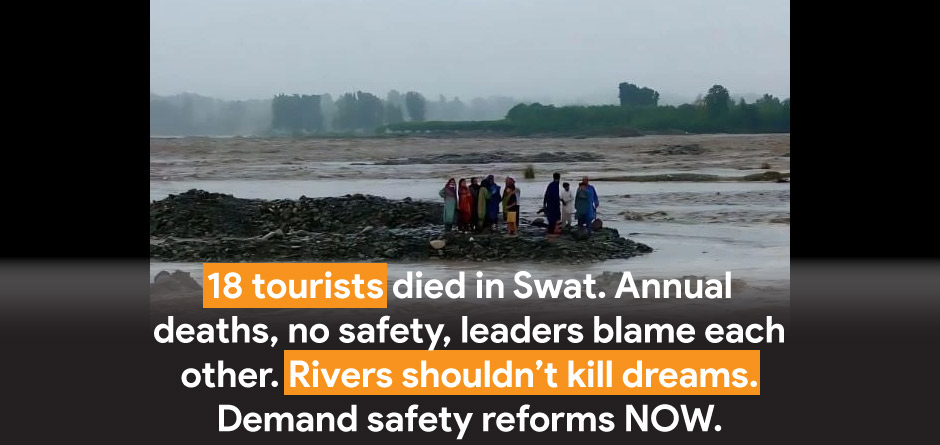Physical Address
304 North Cardinal St.
Dorchester Center, MA 02124
Physical Address
304 North Cardinal St.
Dorchester Center, MA 02124

Another bright day in the breathtaking valleys of Swat turned into a horrific tragedy on Friday, June 27, 2025 as 18 people—mostly young tourists—were swept away by the ferocious currents of the Swat River. Their lives ended not in some unforeseen natural calamity but in a grimly predictable disaster that Pakistan witnesses every year—a pattern of carelessness, absent safety protocols, and complete state indifference. This heartbreaking incident is a microcosm of what ails our governance, society, and political priorities.
Responsibility begins squarely with the provincial and federal governments, which have systematically failed to regulate and secure tourist destinations like Swat. The Swat Valley, while a jewel of Pakistan’s natural beauty, remains a death trap in peak tourist seasons. Tourists, including families and children, are left without guides, warning signs, barriers, or basic safety measures near riverbanks notorious for sudden swells.
Beyond the government, parents and guardians also share responsibility. When entire families wade into dangerous waters without life jackets or caution, they gamble not only with their own lives but with those of their children.
Tragedy has once again ignited a blame game between Islamabad and Peshawar. Federal ministers blame the Khyber Pakhtunkhwa (KPK) administration for incompetence, while the provincial leadership accuses the federal government of withholding funds and ignoring the region. Meanwhile, grieving families get neither consolation nor justice—only hollow words from leaders more concerned with political mileage than the loss of life.
Among the most disturbing aspects of this and similar incidents is the role of selfie culture. Obsessed with capturing thrilling images for social media, many victims were reportedly standing precariously close to the river or even posing on rocks in the riverbed. This reckless pursuit of viral content, fed by social pressure and online validation, turns a moment of joy into irreversible tragedy.
Selfies aren’t inherently bad, but the unrestrained desire to push limits for a perfect shot—especially near dangerous terrains—has proven fatal time and again. We as a society must start a conversation about redefining what we value in travel and life.
Parents, especially when traveling with minors, must exercise vigilance. The excitement of adventure cannot override the responsibility to protect one’s family. Tragically, many parents join children in risky behaviors—standing too close to gushing waters, ignoring warnings, or even encouraging dangerous photo ops.
While the government must set the safety framework, personal responsibility is irreplaceable.
Every year, the Swat River claims lives—sometimes dozens. Yet, no serious action has ever been taken. No fencing, no designated safe zones, no tourist guides to warn of dangerous spots, no rescue drills, and no public education campaigns on river safety. Tourism departments at both federal and provincial levels have failed repeatedly, and their neglect makes them complicit.
The absence of rapid-response rescue teams is glaring. Even after hours of the incident, reports suggest rescue boats were ill-equipped and untrained volunteers had to risk their own lives to pull bodies from the water. In a region marketed globally as a premier tourist destination, this is nothing short of criminal negligence.
Rather than focusing on governance, the KPK government is engrossed in internal power struggles and party politics, especially since the recent reshuffling of PTI leadership. Instead of coordinated strategies to protect and develop tourism, efforts are diverted toward political survival, personal rivalries, and appeasing factions.
Governor KPK has limited himself to a campaign of attacks on Chief Minister Ali Amin Gandapur, a spectacle of blame devoid of solutions. This is in stark contrast to leaders like Sindh’s Governor Kamran Tessori, who, despite his own political controversies, has taken a hands-on approach in helping people during emergencies—distributing aid, visiting affected areas, and mediating conflicts on the ground.
KPK’s leadership must learn from proactive examples, shedding political theater in favor of serving the people.
At the very least, political parties should unite on matters of public safety and welfare. Infrastructure for tourism, safety protocols, and emergency response systems cannot become pawns in political rivalries. Every lost life is a scar on the conscience of our leaders—yet their indifference persists.
Pakistan’s mountains, valleys, rivers, and beaches could rival any destination on earth. We have the resources, landscapes, and hospitality to transform tourism into a world-class industry. But non-utilization, political instability, and chronic leg-pulling reduce every opportunity to zero. Tourists will continue dying, potential will remain wasted, and poverty will fester in regions that could thrive—unless we break this cycle.
This tragedy must serve as a watershed moment. Not just for the grieving families, but for every Pakistani who dreams of a safer, prosperous country. Leaders at every level must abandon hollow rhetoric, enact meaningful reforms, and put human life before politics. Only then can we honor the lives lost—and prevent the next avoidable tragedy.